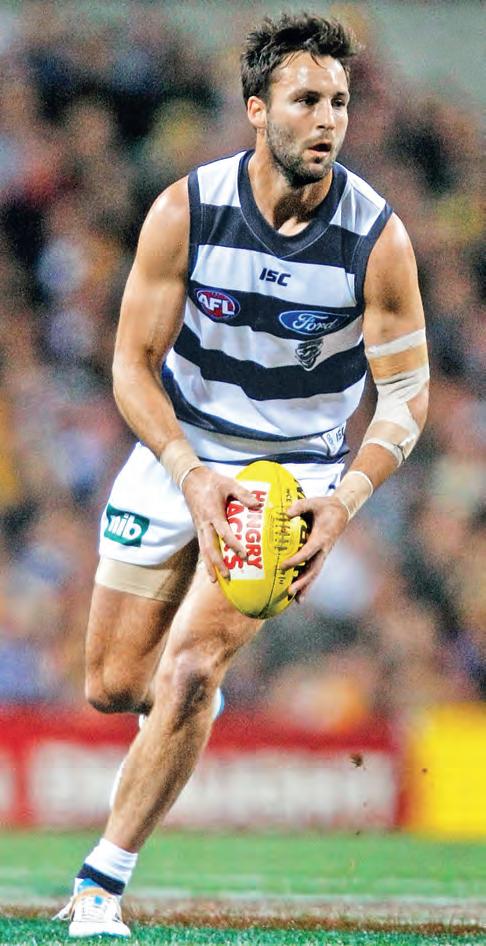
4 minute read
JIMMY BARTEL BIG-GAME SUPERSTAR
Fact File
Club: Geelong Born: December 4, 1983
Recruited from: Bell Park (Vic)/ Geelong U18
Playing career: 2002-16
Games: 305
Goals: 202
Player honours: Brownlow Medal 2007; All-Australian 2007, 2008; Norm Smith Medal 2001; premierships 2007, 2009, 2011.
When compared with nearly all of those he now stands alongside in the Hall of Fame, Jimmy Bartel was a late starter to football.
Further, if mother Dianne had said yes to a sliding doors opportunity when she took young Jimmy and elder sisters Olivia and Emma to the United States for a year when he was 10 as part of a teaching exchange, he might be being recognised now as a great of American football, rather than the Australian game.
While most start kicking a footy before five, Bartel had never played a competitive game when the family headed to the States.
He immediately took to the American game, as well as soccer and basketball, to the extent a local family suggested he stay on in the US for a sporting pathway through high school and college.
Dianne wasn’t about to leave her youngest child in the US, despite his talents, and the young man started his path to becoming a triple premiership champion for Geelong upon his return, thanks especially to the contribution of his mother and sisters.
“I’d never played footy until I came home from the States, but
I was always a very active kid with lots of cricket, basketball, other sports,” Bartel recalled.
“I used to ride my bike to watch my sisters play netball and I got asked to fill in for a game one day at the local footy ground (Bell Park) where my sisters would play.
“It all started from there, when I was 11, which was older than most other kids when they start, but playing so much sport as a kid built the greatest bonding experience with my mum over those years through my teens.
“Any kid who comes from regional Australia knows that you spend a lot of hours in the car and for me it was with mum.
“To get the call about the Hall of Fame is a huge honour and I immediately told (partner) Amelia and then wanted to share it with mum, Olivia and Emma, because it’s their news too for everything they did for me.”
At his peak, Bartel was tough, highly skilled, could see the game unfold before most and was an exceptional mark for his size.
He did the common things uncommonly well and, in wet conditions, the sight of the Geelong No. 3 in long sleeves would immediately cheer Cats fans, such was his record in poor weather.

As a sports-mad kid, Bartel spent his teens happily rolling from footy season into basketball and then cricket, without thinking too much of the future, until his bottom-age year with the Geelong Falcons.
Then, only he and fellow 16-year-old Luke Hodge would get a regular game in a strong outfit alongside their elders hoping for higher honours.
“I was a bit oblivious to my footy development, because I was also playing cricket with the Victorian under-17s, but it then became a very real idea a year later once (Cats recruiting manager) Stephen Wells and (coach Mark) ‘Bomber’ Thompson came to chat to me a couple of times,” he said.
“When I look back now, I’m just so grateful I got to be taken by Geelong at a time of transition, and be able to be part of such a great club.”
In the drafts before 2001, the Cats had started their refresh by selecting the likes of Joel Corey, Cameron Ling, Corey Enright and Paul Chapman, while it’s footy folklore now that their extraordinary 2001 haul yielded them not just Bartel, but James Kelly, Steve Johnson and Gary Ablett.
That group was the core to end a 44-year premiership drought and secure three flags between 2007-11, with Bartel front and centre in all three.
“The Cats were a very good club, but they were trying to be great, and that’s very hard to achieve,” he said.
“The story of how it was done, led by (president) Frank Costa, (CEO) Brian Cook and Bomber, is well known these days, but to be part of that is still such a great thrill for when I look back on my time in footy.
“When I see former teammates these days, it’s great to be able to explain who they are to my boys (Aston and Henley), who are starting to ask about the game, and to be able to say that I played with that guy.”
In the breakthrough 2007 premiership year, Bartel claimed the Brownlow Medal despite missing the last two home and away games, and then had 28 touches and kicked two goals on the last Saturday in September.
In the 2009 Grand Final, an all-time classic against St Kilda, Bartel first contained and then eclipsed the brilliant Lenny Hayes, while in the 2011 premiership, he claimed the Norm Smith Medal with 26 touches and three goals.
In the latter part of the premiership period, two more greats in Tom Hawkins and Harry Taylor cemented themselves as pillars of the spine, while the coaching changeover from Thompson to Chris Scott only served to drive the players on to ensure they achieved all they could.
“I always wanted to be the man in the arena, trying to strive and win, and that was absolutely what all the senior players felt –and Chris drove exactly the same message from the time he arrived,” Bartel said.
To be in the Hall of Fame, and one day explaining what that means to Aston, Henley and newborn Paloma, drew a wide smile.
“When my kids are older, they will know that dad was OK at something,” he said with a laugh.
“You can’t hope or expect you will get this, and it’s an incredible honour.”
Of that Geelong team, Bartel joins Matthew Scarlett in the Hall of Fame and the former full-back is one of three who stands apart in Bartel’s mind of all his teammates.

“I played with so many great players people always ask about, but to play with Scarlett, Ablett and (Joel) Selwood was a privilege.
“Scarlett is a player who helped revolutionise the game as a full-back ... (he) would regularly have 25 touches and be so attacking.
“‘Gazza’ and I played underage footy and he was just awesome. I still can’t believe some of the things he did.
“Joel had the drive from day one to be the best. I was so happy with Grand Final day last year because everyone got to see what we already all knew at Geelong.
“The broader football world could all see why we loved him.”









